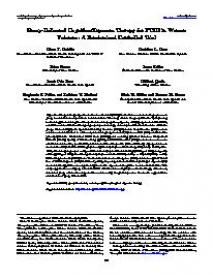Group-delivered cognitive/exposure therapy for PTSD in women veterans : A randomized controlled trial
Objective: Group delivery of posttraumatic stress disorder (PTSD) treatment has several advantages, however group research is not comparable to individual trials. This study extends the group literature by improving methodology in examining the efficacy of a 3-module (cognitive, exposure, skills) group treatment for PTSD, establishes a format for the delivery of group exposure therapy, and compares 3 treatment modules within the group.
Method: Eighty-six Operation Enduring Freedom (OEF)/Operation Iraqi Freedom (OIF) women veterans were randomized to a 16-week, 3-member group treatment (Tx) or a waitlist (WL) condition. The primary (Clinician Administered PTSD Scale [CAPS]) and secondary (Medical Outcomes Study Short Form-36 [SF-36], Quality of Life Inventory [QOLI], and PTSD Checklist [PCL]) outcome measures were administered at baseline, post Tx/WL, and at 3- and 6-months post Tx (PCL additionally at pre/post for each treatment module).
Results: PTSD symptoms significantly improved in Tx arm participants (p < .001, ES = 1.72; unit of analysis group: n = 14), as did mental and physical life functioning (SF-36; p < .001), and quality of life (QOLI; p < .001). The WL significantly improved on the SF-36 (mental; p = .04) and QOLI (p = .02). Clinical improvement (CAPS) in the Tx arm reflected a treatment response (≥10-point decrease) in 77% and loss of PTSD diagnosis (<45) in 52% of participants, comparable to individual prolonged exposure (PE) treatment. Finally, PCL scores significantly lowered in exposure and cognitive modules.
Conclusions: This study supports the use of group format for PTSD with 3 modules using improved methodology, with a novel, 3-member group which allows repeated in-session weekly imaginal exposures. The results suggest future examination of group delivered PE. (PsycINFO Database Record (c) 2016 APA, all rights reserved)
Geachte bezoeker,
De informatie die u nu opvraagt, kan door psychotraumanet niet aan u worden getoond. Dit kan verschillende redenen hebben,
waarvan (bescherming van het) auteursrecht de meeste voorkomende is. Wanneer het mogelijk is om u door te verwijzen naar de bron
van deze informatie, dan ziet u hier onder een link naar die plek.
Als er geen link staat, kunt u contact opnemen met de bibliotheek,
die u verder op weg kan helpen.
Met vriendelijke groet,
Het psychotraumanet-team.
In: Psychological Trauma: Theory, Research, Practice, and Policy, ISSN 1942-969X | 8 | 3 | May | 404-412
http://dx.doi.org/10.1037/tra0000111


